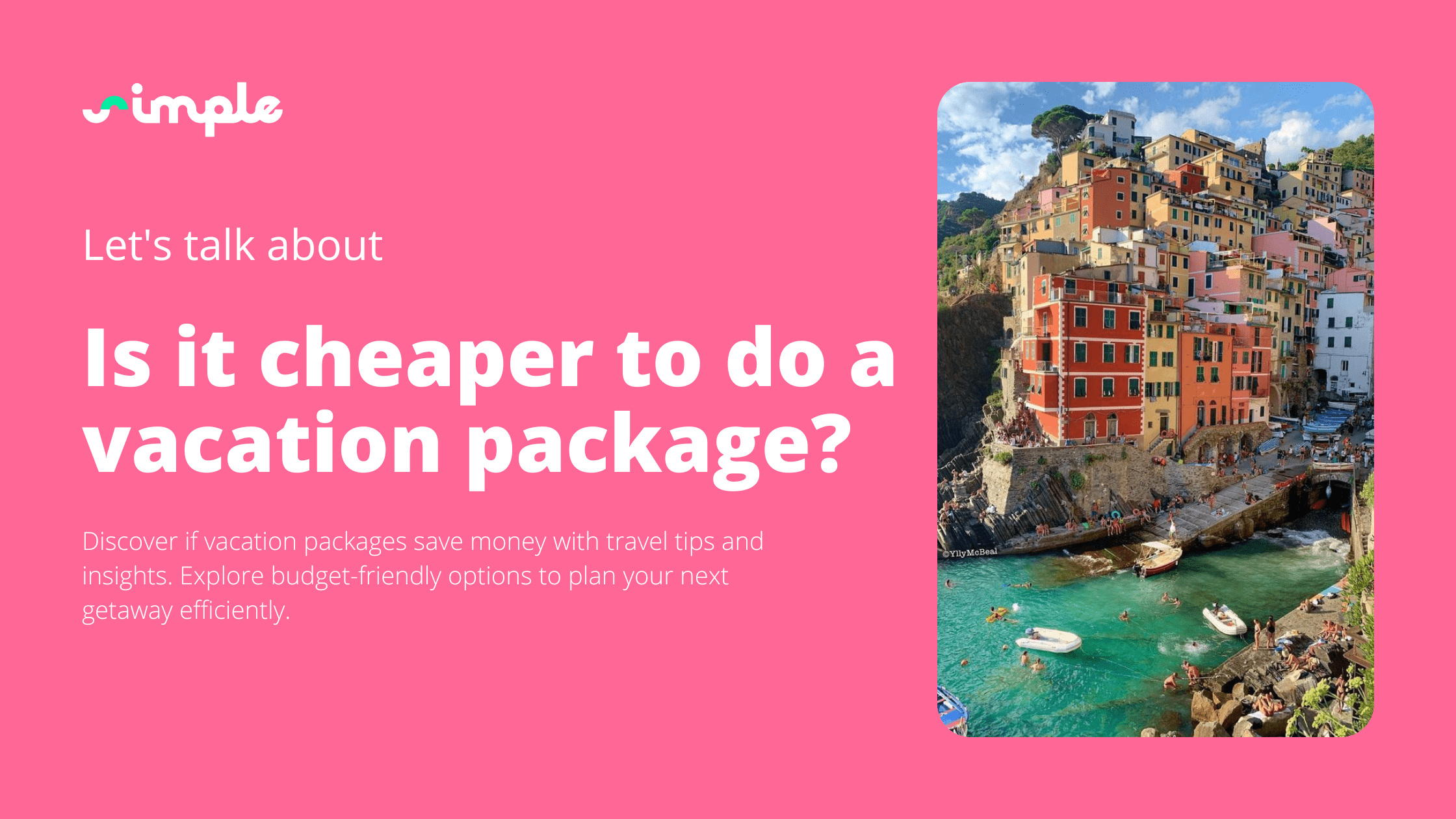Is it cheaper to do a vacation package?

Vacation packages have become a popular choice for travelers seeking convenience and potential cost savings. These packages often bundle flights, accommodations, and sometimes even activities, offering a one-stop solution for those looking to simplify their travel plans. The allure of vacation packages lies in their promise of affordability and ease, making them an attractive option for both seasoned travelers and those new to exploring the world. However, the question remains: are vacation packages genuinely more economical than planning a trip independently?
Many travelers are drawn to vacation packages with the belief that they offer significant savings. The idea of having everything organized in one package can be appealing, especially for those who want to avoid the hassle of booking each component separately. Yet, the perception of cost-effectiveness can vary depending on the destination, the time of year, and the specific inclusions of the package. As the travel industry evolves, so do the options available to consumers, making it essential to weigh the benefits and drawbacks of vacation packages against the potential savings of a DIY approach.
Understanding the true value of vacation packages requires a closer look at the components involved and how they compare to individual bookings. By examining factors such as travel destinations, accommodations, and additional perks, travelers can make informed decisions about whether a vacation package aligns with their budget and travel goals. For more insights on travel, visit our travel page.
Benefits of Vacation Packages
Economies of Scale

One of the primary benefits of vacation packages is the economies of scale that providers can leverage. Travel companies often negotiate better rates with airlines, hotels, and local attractions due to the volume of bookings they bring. This bulk booking allows them to secure discounts that are not typically available to individual travelers. By purchasing in large quantities, these providers can pass on the savings to consumers, making vacation packages an attractive option for budget-conscious travelers.
For instance, a travel agency might negotiate a lower rate for a block of hotel rooms or a group of airline seats, which can significantly reduce the overall cost of a vacation package. These savings are then reflected in the package price, offering travelers a more affordable option than if they were to book each component separately. This advantage is particularly beneficial for popular travel destinations where accommodation and flight prices can fluctuate based on demand.
Moreover, the ability to secure lower rates through bulk bookings can also lead to additional perks, such as room upgrades or complimentary meals, further enhancing the value of vacation packages. These added benefits can make a significant difference in the overall travel experience, providing travelers with more for their money. As a result, vacation packages can be a cost-effective solution for those looking to maximize their travel budget without compromising on quality or convenience.
Convenience and Bundled Discounts
Another significant advantage of vacation packages is the convenience they offer. By bundling airfare, accommodation, and activities into a single package, travelers can save time and effort in planning their trips. This all-in-one approach simplifies the booking process, allowing travelers to focus on enjoying their vacation rather than worrying about the logistics of organizing each component separately.
The bundled nature of vacation packages often brings added discounts, as providers can offer reduced rates for combining multiple services. For example, a package that includes flights, hotel stays, and guided tours may be priced lower than if each element were booked independently. This bundling can lead to substantial savings, particularly for those planning complex itineraries or visiting multiple destinations.
Additionally, vacation packages can provide peace of mind by ensuring that all aspects of the trip are coordinated and confirmed in advance. This can be especially beneficial for family vacation ideas, where coordinating schedules and preferences can be challenging. By opting for a package, families can enjoy a seamless travel experience with minimal stress, knowing that all details have been taken care of by the provider.
Reduced Unforeseen Expenses

Vacation packages can also help minimize unforeseen expenses that travelers might overlook when planning a trip independently. Hidden costs, such as airport transfers, baggage fees, or entrance fees to attractions, can quickly add up and strain a travel budget. By choosing a package, travelers can often avoid these unexpected expenses, as many packages include these elements in the overall price.
For example, a package tour might cover transportation between the airport and hotel, eliminating the need for costly taxi rides or shuttle services. Similarly, entrance fees to popular attractions or guided tours may be included, providing additional savings and ensuring that travelers can fully enjoy their chosen travel destinations without worrying about extra costs.
By offering a comprehensive solution that addresses potential hidden costs, vacation packages can provide a more predictable and manageable travel budget. This can be particularly advantageous for those engaging in adventure tourism or eco-friendly travel, where unexpected expenses can arise due to the nature of the activities involved. Ultimately, vacation packages can offer a more transparent and cost-effective way to explore the world, allowing travelers to focus on creating memorable experiences rather than managing their finances.
Potential Drawbacks of Vacation Packages
Lack of Customization

While vacation packages offer convenience and potential savings, they often come with a lack of customization that can limit the flexibility and personalization of travel experiences. Many packages are designed to appeal to a broad audience, which means they may not cater to individual preferences or specific travel goals. For travelers seeking unique cultural experiences or those interested in adventure tourism, the standardized nature of vacation packages can be a drawback.
When opting for a vacation package, travelers may find themselves restricted by predetermined itineraries and schedules. This lack of control can lead to higher costs if travelers wish to deviate from the planned activities or accommodations. For instance, a traveler who prefers boutique hotels over large resorts may incur additional expenses if the package does not offer such options. Similarly, those interested in solo travel adventures might find the group-oriented nature of many packages limiting.
Moreover, the inability to tailor a travel itinerary to personal interests can detract from the overall experience. Travelers who value spontaneity and the freedom to explore at their own pace may find vacation packages too rigid. This can be particularly frustrating for those who enjoy road trip planning or discovering off-the-beaten-path destinations. Ultimately, the lack of customization in vacation packages can be a significant disadvantage for travelers who prioritize individuality and flexibility in their travel plans.
Misleading Pricing
Another potential drawback of vacation packages is the issue of misleading pricing. While packages are often marketed as offering significant savings, the advertised discounts can sometimes be inflated or unclear. This lack of transparency can make it challenging for travelers to assess the true value of a package and compare it to the cost of booking each component separately.
In some cases, the initial price of a vacation package may not include all necessary expenses, such as travel insurance or additional fees for certain activities. This can lead to unexpected costs that diminish the perceived savings. Travelers may also encounter situations where the advertised price is only available for a limited time or under specific conditions, making it difficult to secure the deal.
To avoid falling victim to misleading pricing, travelers should carefully review the details of any vacation package and inquire about any hidden fees or exclusions. Comparing the total package cost with the cost of individual bookings can provide a clearer picture of the potential savings. By being vigilant and informed, travelers can make more confident decisions and avoid the pitfalls of unclear pricing.
Sales Tactics and Restrictions
Vacation packages can also be accompanied by high-pressure sales tactics and restrictive terms that may not align with a traveler’s needs or preferences. Some providers may employ aggressive marketing strategies to encourage travelers to purchase additional services or upgrades, leading to unnecessary expenses. These tactics can create a sense of urgency, pressuring travelers into making hasty decisions without fully considering their options.
Additionally, vacation packages often come with restrictions and limitations, such as non-refundable deposits or strict cancellation policies. These terms can be problematic for travelers whose plans may change or who prefer the flexibility to adjust their itinerary. For instance, business travel arrangements may require last-minute changes that are not accommodated by rigid package terms.
To navigate these challenges, travelers should thoroughly read the terms and conditions of any vacation package and ask questions about any unclear aspects. Understanding the restrictions and potential penalties can help travelers make informed choices and avoid unexpected complications. By being aware of the potential drawbacks, travelers can better assess whether a vacation package is the right fit for their travel style and objectives.
Factors Influencing Cost-Effectiveness
Destination-Specific Considerations
The cost-effectiveness of vacation packages can vary significantly depending on the travel destination. Some destinations are more conducive to package deals due to the availability of bundled services and the competitive nature of the local tourism industry. For instance, popular tourist spots like major cities or beach resorts often have a plethora of vacation packages that offer excellent value, as providers compete to attract travelers with attractive deals.
In contrast, less-traveled or remote destinations may not offer the same level of package options, making DIY planning a more viable and potentially cost-effective choice. Travelers interested in adventure tourism or exploring unique cultural experiences might find that independently organizing their trip allows for greater flexibility and access to local insights that packaged tours may not provide. In such cases, the ability to customize travel accommodations and activities can outweigh the benefits of a pre-arranged package.
Ultimately, the decision between a vacation package and DIY planning should consider the specific characteristics of the destination. Researching the local tourism infrastructure and comparing package offerings with individual bookings can help travelers determine the most cost-effective approach for their chosen travel destinations.
Seasonal Variations in Pricing

Seasonal variations in pricing play a crucial role in the cost-effectiveness of vacation packages. Travel seasons, such as peak and off-peak periods, can significantly impact the availability and pricing of packages. During peak travel seasons, such as summer holidays or major festivals, the demand for travel services increases, often leading to higher prices for both packages and individual bookings.
However, vacation packages can sometimes offer better value during these high-demand periods, as providers may have pre-negotiated rates that are lower than the current market prices. Conversely, off-peak travel can present opportunities for substantial savings, as both package providers and individual service providers offer discounts to attract travelers during slower periods.
Travelers seeking budget travel options should consider the timing of their trip and explore the potential savings associated with off-peak travel. By being flexible with travel dates and taking advantage of seasonal discounts, travelers can maximize the cost-effectiveness of their vacation, whether through a package or independent planning.
Traveler Preferences and Priorities
Individual traveler preferences and priorities are key factors in determining the perceived value of vacation packages. Each traveler has unique needs and desires, which can influence the overall cost-effectiveness of a package. For example, a family vacation might prioritize convenience and ease of planning, making a package with bundled services and family-friendly activities an attractive option.
On the other hand, solo travel adventures or business travel may require more personalized arrangements that a standard package cannot accommodate. In such cases, the ability to tailor a travel itinerary to specific preferences can lead to greater satisfaction and potentially lower costs, as travelers can choose only the services they need.
Additionally, personal priorities, such as a focus on eco-friendly travel or a desire for luxury accommodations, can impact the cost-effectiveness of a package. Travelers who prioritize sustainability might find that certain packages offer eco-friendly options that align with their values, while those seeking luxury experiences may need to weigh the benefits of a package against the potential for higher costs due to premium services.
By assessing their individual preferences and priorities, travelers can make informed decisions about whether a vacation package offers the best value for their specific needs. Understanding these factors can help travelers navigate the complexities of travel planning and choose the most cost-effective approach for their unique travel goals.
Conclusion
The analysis of vacation packages versus DIY travel planning reveals a complex landscape where the best choice depends on various factors, including destination, timing, and personal preferences. Vacation packages offer undeniable benefits such as economies of scale, convenience, and reduced unforeseen expenses. These advantages make them an appealing option for travelers seeking a streamlined and potentially cost-effective way to explore new places. However, the lack of customization, potential for misleading pricing, and restrictive terms can detract from their overall value, particularly for those who prioritize flexibility and personalized experiences.
On the other hand, DIY travel planning provides the freedom to tailor every aspect of a trip to individual tastes and needs. This approach can be more rewarding for travelers who enjoy the process of crafting a unique itinerary and have specific interests that may not be accommodated by standard packages. While DIY planning can sometimes lead to higher costs, it also offers opportunities for savings through careful research and strategic booking, especially in destinations where package options are limited or during off-peak travel periods.
For prospective travelers evaluating the true cost-effectiveness of vacation packages, it is essential to consider both the tangible and intangible aspects of travel. Tangible factors include the total cost of the package versus individual bookings, while intangible factors encompass the value of convenience, peace of mind, and the quality of experiences. By weighing these elements against personal travel goals and priorities, travelers can make informed decisions that align with their budget and desired travel experience.
Ultimately, the choice between a vacation package and DIY travel planning is a personal one, influenced by a myriad of considerations. By understanding the benefits and drawbacks of each option, travelers can navigate the complexities of travel planning with confidence and clarity, ensuring a rewarding and memorable journey that meets their unique needs and aspirations.